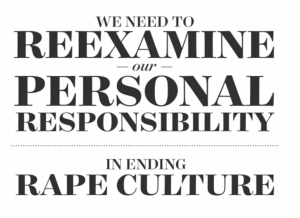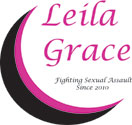Most of the university trainings I have completed as a student are focused on girls carrying pepper spray, being cautious about where they walk and when, and what they should do to defend themselves if assaulted. The cause of sexual assault has nothing to do with the victim; it is about power and control.

Advocates have taken to the front lines nationwide and helped to develop sexual assault task forces that are trying to address the real issues underlying the reprehensible rates of sexual assaults on university campuses. I recently had to complete the “Think About It: Graduate Students” training (provided by CampusClarity ) for the University of Chicago. The training starts with a video clip that gives startling statistics and information about rape culture that sets the stage for the learner to be challenged to view rape culture as something we all participate in and have a responsibility to take action on.

The outline for the programming includes the roots of harassment and sexual misconduct, how to identify abusive relationships and sexual violence, creating a supportive environment, and practical strategies for dealing with sexual misconduct. The format of the program is a simple click-through presentation combining information with knowledge checks.

A major strength of the training is the identification of specific areas of needed attention like the importance of non-offensive terminology when speaking to victims of sexual assault. The training provides a layperson friendly summary of state laws regarding sexual violence and misconduct as well as links to the actual legal documents. The training details the important distinction between healthy, unhealthy, and abusive relationships. The training is gender neutral throughout. While it was wonderful to see a section on “how to help a survivor” included, those are resources an individual would need to access at a later point and clicking through this whole presentation would be cumbersome in the midst of a crisis. A quick reference document or website with all of the resources mentioned in the training would be useful in connection with the training.

The section on alcohol use held alcohol too responsible for an individual’s behavior. If you aren’t a rapist, you won’t rape no matter how much alcohol you drink. The training has a section titled “Barriers to Mutual Consent”. The only true barrier to mutual consent is one individual deciding to take another individual’s choice away from her or him. The training does not include any specific information addressing trans persons while they are more likely than cisgender individuals to experience sexual violence. Lastly, the training does not specifically address same sex sexual violence.
The training is overwhelmingly a step in the right direction, extremely comprehensive, and could be very effective in preventing sexual assault. The weaknesses I identified are all correctable. The course overall is light in putting the full weight on the perpetrator unapologetically. Until we stop being afraid of offending perpetrators, we can never make tangible change in the culture of rape we live in.
Rachel Newhouse
ladyzirkhouse.blogspot.com
Sexual Assault Nurse Examiner, Certified Nurse Midwife, Ph.D. Student, Fearless Feminist

